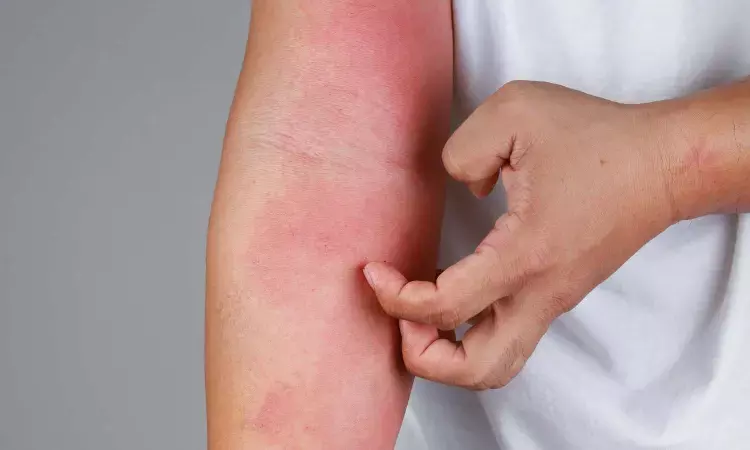- Home
- Medical news & Guidelines
- Anesthesiology
- Cardiology and CTVS
- Critical Care
- Dentistry
- Dermatology
- Diabetes and Endocrinology
- ENT
- Gastroenterology
- Medicine
- Nephrology
- Neurology
- Obstretics-Gynaecology
- Oncology
- Ophthalmology
- Orthopaedics
- Pediatrics-Neonatology
- Psychiatry
- Pulmonology
- Radiology
- Surgery
- Urology
- Laboratory Medicine
- Diet
- Nursing
- Paramedical
- Physiotherapy
- Health news
- Fact Check
- Bone Health Fact Check
- Brain Health Fact Check
- Cancer Related Fact Check
- Child Care Fact Check
- Dental and oral health fact check
- Diabetes and metabolic health fact check
- Diet and Nutrition Fact Check
- Eye and ENT Care Fact Check
- Fitness fact check
- Gut health fact check
- Heart health fact check
- Kidney health fact check
- Medical education fact check
- Men's health fact check
- Respiratory fact check
- Skin and hair care fact check
- Vaccine and Immunization fact check
- Women's health fact check
- AYUSH
- State News
- Andaman and Nicobar Islands
- Andhra Pradesh
- Arunachal Pradesh
- Assam
- Bihar
- Chandigarh
- Chattisgarh
- Dadra and Nagar Haveli
- Daman and Diu
- Delhi
- Goa
- Gujarat
- Haryana
- Himachal Pradesh
- Jammu & Kashmir
- Jharkhand
- Karnataka
- Kerala
- Ladakh
- Lakshadweep
- Madhya Pradesh
- Maharashtra
- Manipur
- Meghalaya
- Mizoram
- Nagaland
- Odisha
- Puducherry
- Punjab
- Rajasthan
- Sikkim
- Tamil Nadu
- Telangana
- Tripura
- Uttar Pradesh
- Uttrakhand
- West Bengal
- Medical Education
- Industry
Crisaborole ointment safe and effective for treating mild to moderate atopic dermatitis

China: A recent study in The Journal of Dermatology has shown crisaborole to be safe and well-tolerated for treating patients with mild-to-moderate atopic dermatitis (AD).
Atopic dermatitis is a chronic inflammatory skin disease that significantly affects the overall well-being of patients and their families. AD-related symptoms such as pruritus, cosmetically visible manifestations including excoriation, erythema, and lichenification, and the chronic, relapsing nature of the disease, significantly affect education, work, and social activities.
2% Crisaborole ointment is a nonsteroidal phosphodiesterase 4 (PDE4) inhibitor approved for treating mild-to-moderate atopic dermatitis in multiple countries and regions. However, in the vital pivotal trials, a low proportion of the overall patient population was Asian; therefore, there is no clarity on crisaborole's efficacy and safety in the Asian population with atopic dermatitis.
"Previous studies mainly evaluated populations in Western countries; thus, it was important to evaluate the safety and efficacy of crisaborole ointment in an Asian patient population," the researchers wrote.
Therefore, Lin Ma, Capital Medical University, National Center for Children's Health, Beijing, China, and colleagues aimed to analyze the safety and efficacy of crisaborole in Japanese and Chinese patients aged ≥2 years with mild-to-moderate atopic dermatitis in the CrisADe CLEAR study.
CrisADe CLEAR was a randomized, multicenter, vehicle-controlled, double-blind, phase 3 study involving Japanese and Chinese patients aged ≥2 years with mild-to-moderate atopic dermatitis comprising ≥5% treatable body surface area. Patients were randomly assigned in a ratio of 2:1 to receive crisaborole or vehicle twice daily for 28 days.
Safety assessment was done using rates of treatment-emergent adverse events, clinically significant changes in vital signs and clinical laboratory parameters, and serious adverse events. The primary endpoint was the percentage change from baseline at day 29 in the total score of the Eczema Area and Severity Index. Additional endpoints included improvement and success per Investigator's Static Global Assessment score on day 29 and a change from baseline on the Peak Pruritus Numerical Rating Scale at week 4.
The study revealed the following findings:
- Crisaborole-treated patients showed a significantly more significant reduction versus vehicle percentage change from baseline in Eczema Area and Severity Index total score at day 29.
- Response rates for the achievement of Investigator's Static Global Assessment improvement and success at day 29 were significantly higher for patients treated with crisaborole versus vehicle.
- Crisaborole-treated patients showed a significantly more significant reduction versus vehicle in change from baseline on the Peak Pruritus Numerical Rating Scale at week 4.
- No new safety signals were identified.
Crisaborole demonstrated superior efficacy in all primary and critical secondary endpoints versus vehicle, and no new safety signals were identified.
"Crisaborole was effective and well tolerated in Chinese and Japanese patients aged ≥2 years with mild-to-moderate atopic dermatitis," the researchers concluded.
Reference:
Ma, L., Zhang, L., Kobayashi, M., Tao, X., Qian, Q., Cheng, H., Liu, S., Zhou, Y., Chen, Y., & Zhang, J. Efficacy and safety of crisaborole ointment in Chinese and Japanese patients aged ≥2 years with mild-to-moderate atopic dermatitis. The Journal of Dermatology. https://doi.org/10.1111/1346-8138.16792
Dr Kamal Kant Kohli-MBBS, DTCD- a chest specialist with more than 30 years of practice and a flair for writing clinical articles, Dr Kamal Kant Kohli joined Medical Dialogues as a Chief Editor of Medical News. Besides writing articles, as an editor, he proofreads and verifies all the medical content published on Medical Dialogues including those coming from journals, studies,medical conferences,guidelines etc. Email: drkohli@medicaldialogues.in. Contact no. 011-43720751


